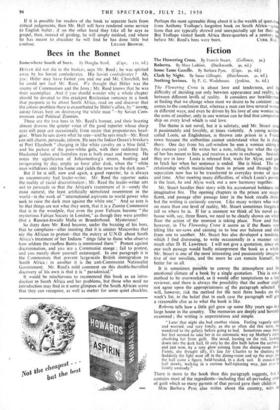Bees in the Bonnet
Somewhere South of Suez. By Douglas Reed. (Cape. 12S. 6d.) HITLER did not die in the bunker, says Mr. Reed ; he was spirited away by his Soviet confederates. His Soviet confederates? Ah, yes : Hitler may have fooled you and me and Mr. Churchill, but he could not fool Mr. Reed. We thought that Hitler was the enemy of Communism and the Jews ; Mr. Reed knows that he was their accomplice. And if you should wonder why a whole chapter should be devoted to this crackpot Ruritanian romance in a book that purports to be about South Africa, read on and discover that the colour-problem there is exacerbated by Hitler's allies, by " strong, astute forces bent on destroying the white man "—by Soviet Com- munism and Political Zionism.
These are the two bees in Mr. Reed's bonnet, and their buzzing almost drowns the quieter voice of the good reporter whose sharp eyes still peep out occasionally from under that preposterous head- gear. When he sets down what he sees—and he sees much—Mr. Reed can still charm, persuade, inform. He sees the Indian Ocean's breakers at Port Elizabeth " charging in like white cavalry on a blue field," and his picture of the poor-white girls, with their reddened lips, blackened lashes and lustreless eyes is both exact and moving. He notes the significance of Johannesburg's streets, bustling and invigorating by day, empty an hour after dusk, when the " white man withdraws into his home and yields the town to the dark man."
But if he is still, now and again, a good reporter, he is always an uncommonly bad leader-writer. Mr. Reed the reporter notes the reality of racial discrimination ; Mr. Reed the leader-writer sets out to persuade us that the African's resentment of it—surely the most natural, the least artificially stimulated resentment in the world—is the work of " international aspirants to world power who seek to raise the dark man against the white one." And so sure is he that things are not what they seem, that it is a Zionist Communist that is in the woodpile, that even the poor Fabians become " the mysterious Fabian Society in London," as though they were another (but a Russian-Jewish) Mafia or Broederbond. Mysteriotis!
So dizzy does Mr. Reed become, under the buzzing of his bees, that he complains—after insisting that it is sinister Muscovites that stir the African to protest—that the outcry at U.N.O. about South Africa's treatment of her Indians " rings false to those who observe how seldom the roofless Bantu is mentioned there." Protest against discrimination, and you are a Communist stooge ; fail to protest, and you merely show yourself outstooged.. In one paragraph it is the Communists that prevent large-scale British immigration to South Africa ; in another it is the anti-Communist Nationalist Government. Mr. Reed's mild comment on this double-barrelled discovery of his own is that it is " paradoxical."
It would be mischievous to recommend this book as an intro- duction to South Africa and her problems, but those who need no introduction may find in it some glimpses of the South African scene that they can recognise, as well as matter for some quiet chuckles. Perhaps the most agreeable thing about it is the wealth of quotat from Anthony Trollope's forgotten book on South Africa—quo tions that are typically shrewd and unexpectedly apt for their But Trollope visited South Africa three-quarters of a century ag before Mr. Reed's bees were born. CYRIL Rat.


































 Previous page
Previous page